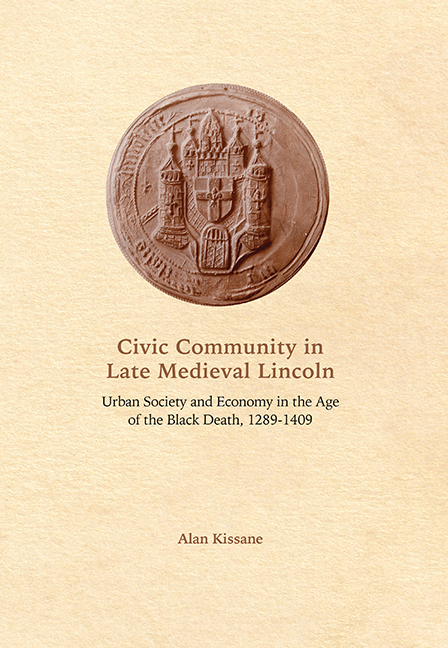 Civic Community in Late Medieval Lincoln
Civic Community in Late Medieval Lincoln Book contents
- Frontmatter
- Contents
- List of Illustrations
- Acknowledgements
- Abbreviations and Note on the Text
- Introduction
- 1 Urban Foundations: Occupational Structure
- 2 Lincoln as Entrepôt: Tolls, Trade and Credit
- 3 The Crown and the Fee Farm
- 4 The Growth of Civic Government
- 5 Fraternity, Orthodoxy and Communal Cooperation
- 6 Chantry Founders, Commemoration and the Rental Market
- Conclusion
- 1 Appendix 1: Occupational Sources and Data
- 2 Appendix 2: Lincoln Civic Officials, 1289-1409
- 3 Appendix 3: Lincoln Members of Parliament, c.1290-1410
- 4 Appendix 4: The Fraternal Year
- 5 Appendix 5: Perpetual Chantry Foundations
- Bibliography
- Index
- Frontmatter
- Contents
- List of Illustrations
- Acknowledgements
- Abbreviations and Note on the Text
- Introduction
- 1 Urban Foundations: Occupational Structure
- 2 Lincoln as Entrepôt: Tolls, Trade and Credit
- 3 The Crown and the Fee Farm
- 4 The Growth of Civic Government
- 5 Fraternity, Orthodoxy and Communal Cooperation
- 6 Chantry Founders, Commemoration and the Rental Market
- Conclusion
- 1 Appendix 1: Occupational Sources and Data
- 2 Appendix 2: Lincoln Civic Officials, 1289-1409
- 3 Appendix 3: Lincoln Members of Parliament, c.1290-1410
- 4 Appendix 4: The Fraternal Year
- 5 Appendix 5: Perpetual Chantry Foundations
- Bibliography
- Index
Summary
This is a study of Lincoln's civic community between the late thirteenth and early fifteenth centuries, a period which begins with the suspension of civil liberties in 1289 and ends with the city being granted urban county status in 1409. It explores how those living within the jurisdiction of the mayor and civic government dealt with and adapted to the challenges of the period, in particular plague, famine and war, and questions to what extent economic and social changes influenced urban patterns of living, local customs and social relations.
It is generally acknowledged that the turn of the fourteenth century marked a new phase in English society, signalling an end to two centuries of economic growth, a period which had otherwise seen a dramatic rise in population, expansion in the number and size of towns and markets and the emergence of a more sophisticated commercial economy. However, as many of these trends began to reverse, English society saw the population begin to outstrip its resources as prices rose and foodstuffs became scarce. The significance of this shift in fortunes was that pockets of society, in particular agrarian communities, began to be pushed towards the edge of subsistence, a phenomenon known in historiography as the ‘Malthusian crisis’. While it is possible that, in isolation, these difficulties might have been managed, they were exacerbated by several other factors, including the increasing fiscal demands of the crown, much of which was used to pay for foreign wars, the commutation of labour services to monetary rents, a declining seigniorial system, a fall in the available money supply and widespread famine and animal disease. The impact of this complex amalgam of problems was that wealth began to be redistributed throughout the kingdom, in particular towards London, East Anglia and the south-east, as different areas of the country proved more resilient than others. Whilst it appears that Lincolnshire fared badly during this period – for example, in 1290 it ranked as the wealthiest county in England, whereas by the 1310s it had fallen to ninth place – the impact on Lincoln has not yet been determined in any systematic way. This study seeks to redress this issue by situating Lincoln within a broader framework of late medieval urban history.
- Type
- Chapter
- Information
- Civic Community in Late Medieval LincolnUrban Society and Economy in the Age of the Black Death, 1289-1409, pp. 1 - 16Publisher: Boydell & BrewerPrint publication year: 2017


